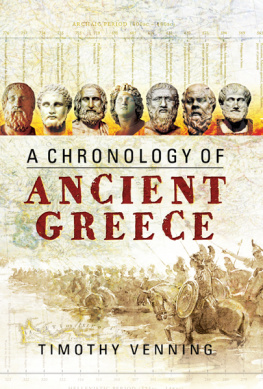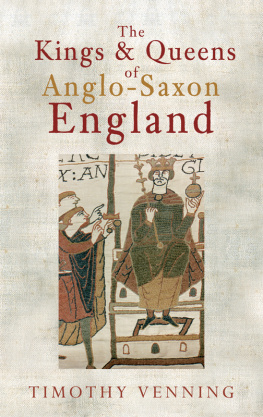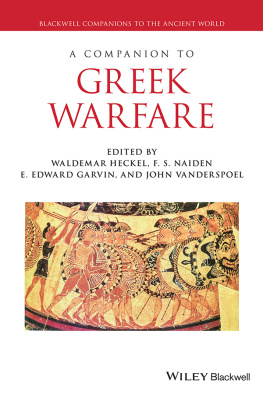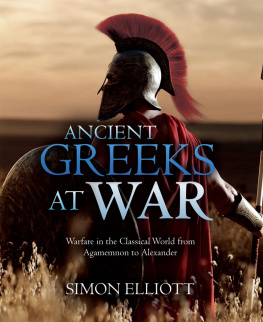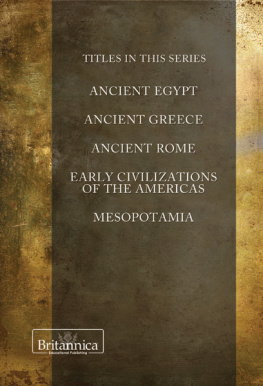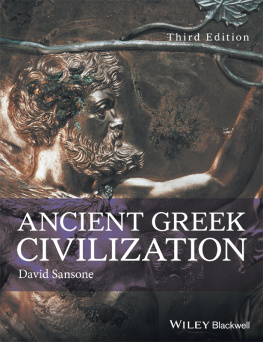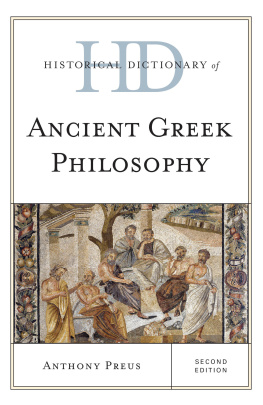First published in Great Britain in 2015 by
Pen & Sword Military
an imprint of
Pen & Sword Books Ltd
47 Church Street
Barnsley
South Yorkshire
S70 2AS
Copyright Timothy Venning 2015
ISBN: 978 1 47383 428 6
PDF ISBN: 978 1 47387 924 9
EPUB ISBN: 978 1 47387 923 2
PRC ISBN: 978 1 47387 922 5
The right of Timothy Venning to be identified as the Author of this Work has been asserted by him in accordance with the Copyright, Designs and Patents Act 1988.
A CIP catalogue record for this book is available from the British Library
All rights reserved. No part of this book may be reproduced or transmitted in any form or by any means, electronic or mechanical including photocopying, recording or by any information storage and retrieval system, without permission from the Publisher in writing.
Typeset in Ehrhardt by
Mac Style Ltd, Bridlington, East Yorkshire
Printed and bound in the UK by CPI Group (UK) Ltd,
Croydon, CRO 4YY
Pen & Sword Books Ltd incorporates the imprints of Pen & Sword Archaeology, Atlas, Aviation, Battleground, Discovery, Family History, History, Maritime, Military, Naval, Politics, Railways, Select, Transport, True Crime, and Fiction, Frontline Books, Leo Cooper, Praetorian Press, Seaforth Publishing and Wharncliffe.
For a complete list of Pen & Sword titles please contact
PEN & SWORD BOOKS LIMITED
47 Church Street, Barnsley, South Yorkshire, S70 2AS, England
E-mail:
Website: www.pen-and-sword.co.uk
Contents
Section One
The Persian Wars c. 560 to 479
560?
Greece
F irst seizure of power in the unstable city-state of Athens by Peisistratus (born c. 596), son of Hippocrates, head of one of the three main contending factions (the hill villages) and a protg/relative of the elderly statesman and constitutional reformer Solon (chief archon in 594/3). Aristotle dates this first coup to the archonship of Comeas, i.e. 561/0.
Solons political and economic reforms probably carried out during his archonship had stabilized Athenian politics for some years afterwards, by cancelling rampant debts that oppressed the poor and by admitting the three higher social classes to a share of political power, but turbulence has returned by the 560s. Peisitratus has risen to political prominence as a military commander by capturing the port of Nisaea from Athens rival Megara in 564. He pretends that he has been attacked in his chariot out in the countryside and shows the citys council his injuries (self-inflicted) in order to be given an official bodyguard, and then uses this to seize power. This and other contemporary one-man regimes in Greece are known as the age of the tyrants, but the word is not a pejorative one in its original context.
At around this time, the embryonic Spartan Alliance in the central Peloponnese nucleus of the later Peloponnesian League emerges. This commences with a rapprochement between Sparta and Tegea after years of conflict, allegedly at the suggestion of the oracle of Delphi and based on Sparta acquiring the bones of Orestes (i.e. the son and successor of legendary ruler Agamemnon at Mycenae in the Argolid) to pose as the leader of the region. The Sparta/Tegea alliance is joined in the 550s (?) by most of Arcadia, Elis, and Sicyon, but Argos stays aloof.
?Expulsion of Peisistratus from Athens (anything from one year to five after his seizure of power), after quarrelling with his rivals Megacles the Alcmaeonid, head of the Paralia coastal faction, and Lycurgus the head of the plain, the rural area around Athens. The faction-names may be based on the home region of the faction-leader rather than a distinct class difference between wealthy lowland region farmers (the plain around Athens, i.e. Lycurgus region, being the richest area) and poorer hillmen. Herodotus is unclear how long the first tyranny lasted except that it was brief; Aristotle, however, dates the expulsion of Peisistratus to five years after 561/0, i.e. ?556.
Persia
?Accession of the creator of the Persian empire, Cyrus the Great, son of Cambyses, of the Achaemenid dynasty that rules the homeland province of the Persians in southern Iran. Probable union with the neighbouring northern state of Media, which Herodotus claims Cyrus takes from his hostile grandfather Astyages though Herodotus story is similar to that of the founder of Mycenae in Greece, Perseus, and his grandfather Acrisius of Argos.
c.5565 or 551/0
Greece
Brief second period of rule by Peisistratus in Athens, involving his return to power in the company of a tall young woman called Phye? whom he has dressed up as the goddess Athene to convince the rural peasantry that he has divine support. She then escorts him by chariot from her village to Athens, in company with his ally Megacles. He forms an alliance with Megacles and marries his daughter, but avoids having children by her, annoying her father, and is expelled again. This implies that his elder sons Hippias and Hipparchus, the first an adult by 546 according to Herodotus, are already born by c. 558, by his first marriage, and he does not want to divide up his estates with a half-Alcmaeonid younger son to their detriment.
Around 555 Sicyon joins the Spartan Alliance after the end of the tyranny (benevolent) of Cleisthenes, father-in-law of the Athenian aristocrat Megacles (above). The date of Cleisthenes death is uncertain; he probably ruled for around thirty years. By around 550 Corinth and Megara have also joined the alliance Megara probably to protect herself against Athens after her defeat by Peisistratus in 564.
Persia/Greece
Croesus, king of Lydia in western Asia Minor, attacks the expanding Persian empire, crossing the River Halys Eastwards, after allegedly sending an enquiry to the oracle at Delphi about the war and being told that he will destroy a great empire Persia, as he thinks, but, in fact, it means his own. He fights a drawn battle with the army of Great King Cyrus, ruler of eastern Asia Minor and Armenia as well as Persia/Media/Syria, then withdraws back to his capital, Sardes, for the winter. Unknown to him, Cyrus is planning to attack in winter contrary to the usual customs of war, and keeps his army mobilized.
Early The Persian army arrives at and besieges Sardes, and Croesus brings his army out to fight but is routed, according to Herodotus by the smell of Cyrus camels panicking his famous cavalrys horses. Croesus is forced to surrender a fortnight later, after Persian mountaineers scale a path up the rock of the citadel; Lydia is annexed to Persia. According to Herodotus and others, Croesus either plans to commit suicide or is punished by being put on a pyre with noble youths and some of his riches, but is (probably) spared by Cyrus as Herodotus thinks likeliest. (The date of this conquest of Lydia is presumed but unclear, and may follow the fall of Babylon in 539).
The annexation of Lydia by Persia is followed by the annexation of the adjacent Greek states of Ionia, who have to pay tribute but retain their autonomy; the inhabitants of the city of Phocaea, besieged by the Persian general Harpagus, evacuate themselves by sea to their colony in Corsica and the inhabitants of Teos move to found Abdera in Thrace.
Probable date of a major war between Sparta and Argos for the rule of the eastern Peloponnese over the region of Thyaea, which Sparta wins according to Herodotus this war is underway when Croesus sends an unsuccessful appeal to Sparta, chief military power in Greece, for aid. Traditionally the war leads to a disputed battle of the champions combat between 300 men from each city, which both claim to win as only two Argives and one Spartan survive, and then a large-scale battle won by Sparta. This conflict leads to the Spartan-led alliance of Peloponnesian states, traditionally known as the Peloponnesian League, dominating central Greece.
Next page
